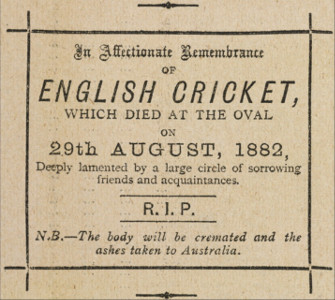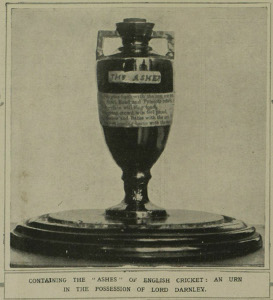
The origin of “the Ashes” as a term comes from a humorous “obituary”, regarding the English team losing against the Australian team at Kennington Oval, on the 29th of August 1882.
The “obituary” was placed in The Sporting Times (London), on the 2nd of September 1882, and stated:
In affectionate remembrance of English cricket, which died at the Oval on 29th August 1882, deeply lamented by a large circle of sorrowing friends and acquaintances.
R.I.P.
N.B. — The body will be cremated and the ashes taken to Australia.

The following matches were played for “the Ashes” in a metaphorical sense, as the original urn was retained by the English captain, Ivo Bligh, as a personal memento (although the urn is now housed in the Marylebone Cricket Club Museum at Lord’s Cricket Ground).
In modern times, the winning team of an Ashes match is presented with a representative urn as a commemoration of their victory.
References and further reading:
“The cricket ‘ashes’”, The Townsville Daily Bulletin (Townsville, Qld.), 9 September 1946, p. 5
““The Ashes”: Mythical cricket prize ”, The Daily News (Perth, WA), 16 August 1926, p. 5
“[In defeating the Eleven of all England]”, The Argus (Melbourne, Vic.), 1 September 1882, p. 4
“The Australian Eleven in England”, The South Australian Advertiser (Adelaide, SA), 7 October 1882, supplement p. 1
“Cricket notes”, The Burra Record (Burra, SA), 10 November 1882, p. 2
“Cricket: The Ashes”, Rupertswood Mansion (accessed 26 July 2012)
“Ashes history”, The Ashes Cricket Live (accessed 26 July 2012)
“The Ashes”, Wikipedia
Leave a Reply